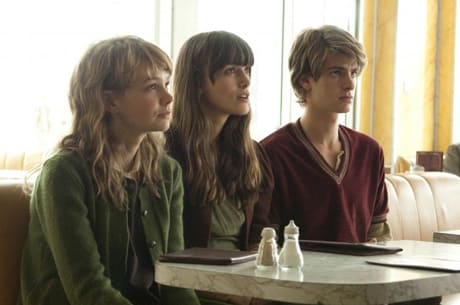In 1978 Hailsham — a seemingly idyllic British boarding school — the young students live a life of quiet routine: going to class, attending morning lecture, playing sports and socializing in their bunks. Tommy (Andrew Garfield/Charlie Rowe), who's prone to emotional outbursts, isn't particularly good at sports, making him a frequent target of ridicule and snide commentary from other students, like the domineering, insecure Ruth (Keira Knightley/Elle Purnell). Her best friend, Cathy (Carey Mulligan/Izzy Meikle-Small), on the other hand, finds his difference intriguing, which complicates their friendship, as does a life-changing moment of revelation. New schoolteacher Miss Lucy (Sally Hawkins) takes the children aside one day and tells them the truth of who they are and what to expect of their future: "None of you will go to America. None of you will get jobs in supermarkets. None of you will do anything but live the life that has been set out for you. Before you are old — before you are even middle-aged — you will start to donate your vital organs. That is what you are here to do. And sometime around your third or fourth donation, your short life will be complete." Miss Lucy is fired the next day. Despite this subtle sci-fi shell, Never Let Me Go isn't concerned with political rebellion or future projections of cloning. Instead, it works as a quiet allegory of life, detailing the lonely fleetingness of it all while following these three students from Hailsham to their adolescent years at the cottages to their eventual donations. Director Mark Romanek handles their journey of personal realization and guarded avoidance with careful, magnetic beauty, allowing silence and lingering glances to reveal repressed character passions and unspoken understandings. Images, such as a single croquet ball in the rain or a lone dress on a clothesline, heighten the pain of living a temporary, pre-determined life of mimicked behaviour and arbitrary social etiquette, as discussed when Cathy confronts Ruth about copying the mannerisms of the people she sees on television. The title also becomes increasingly relevant as the film progresses, hitting home when Cathy leaves her friends in an act of pained frustration only to eventually observe that, "It had never occurred to me that our lives, which had been so closely interwoven, could unravel with such speed. If I'd known, perhaps I'd have kept a closer hold on them." Not since Leolo and Ratcatcher has a film packed such a cathartic emotional punch, for me. It's as though all my worldly disappointments and frustrations were summarized in a haunting, uniquely compelling shell and channelled into Tommy's eventual outburst near the end. Perhaps this personal connection makes me blind to any potential flaws, but as I see it, this is a profoundly moving and devastating story of near-perfection. The DVD includes a Mark Romanek photo gallery, along with a menu of Tommy's art and a brief, but thoughtfully executed, "Making of," where original author Kazuo Ishiguro politely answers ignorant questions such as, "why don't the clones just run away?" with introductory notions of allegory rather than saying, "Well, why don't you run away from your life?"
(Fox)Never Let Me Go
Mark Romanek

BY Robert BellPublished Jan 25, 2011



